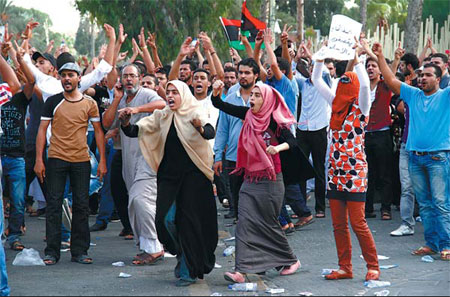Instability, violence grip Libya
|
Demonstrators shout their defiance after militiamen acting as police fire in the air in an attempt to disperse the protest in front of Libya's parliament. A few hundred protesters from the Libyan town of Bani Walid rallied in front of parliament in Tripoli against the weeks of siege of their hometown. Paul Schemm / Associated Press |
One year after Gadhafi's fall, country still faces 'complicated' problems
One year after Libya's transitional authority's declaration of national liberation on Oct 23, 2011, the North African country is still grappling with security concerns, forming a functional new government and boosting a flagging economy amid the ongoing chaos.
The new government will face "complicated" problems, especially in the fields of security, the army, infrastructure construction, creating job opportunities and raising living conditions, the Libyan embassy in China told China Daily.
The government led by Prime Minister Ali Zidan, who was elected on Oct 14, is highly capable of addressing obstacles and challenges, the embassy said in a statement responding to questions from China Daily.
Libya took a major step forward in July by holding its first free elections after the 42-year rule of Muammar Gadhafi, who was toppled with the help of NATO airstrikes. But Zidan faces a difficult task in forming a government capable of tackling security challenges and winning the confidence of rival political and regional factions, since the most tribal country in the Arabic world has a weak army and police forces, experts said.
Security is Libya's top concern, and the government lacks the means to restore order, they said.
Gun culture has taken hold, residents of Benghazi, the cradle of the revolt, told Reuters, citing carjackings, kidnappings, armed robberies and disputes leading to shootouts between rival groups.
In Sirte, Gadhafi's hometown, which once prided itself as the safest place in Libya, "everything shuts down at 10 pm because of the armed gangs", Ali Marj, 22, told AFP.
The government has failed to control the militias, most of them ex-rebels. It is also building a national army and depending heavily on them to secure the country.
"Ultimately, the longer these groups continue to perform security tasks that should be the responsibility of Libyan state security forces, the more difficult it will become to demobilize them or integrate them into the army," Torbjorn Soltvedt, a senior analyst at risk consultancy Maplecroft, told Reuters.
Overwhelmed by sporadic outbreaks of clashes and militant attacks, Tripoli has accused remnants of the former regime of trying to eclipse army and police forces by looting weapons depots, spreading chaos and derailing the transitional process.
The latest case is the tension around the former Gadhafi stronghold of Bani Walid, where the fighting has lasted for five days.
A weak army and police forces are not the main problem, and extremism is not a mainstream force in Libya, said Xue Guoqing, an expert on Arab studies at Beijing Foreign Studies University.
"The root of the turmoil - balancing interests among different tribes - has not been properly addressed over the past year," he said.
The instability gives Washington an entry for increasing its military presence in the oil-rich country, especially after US Ambassador Chris Stevens and three other US citizens died during last month's attack on the US consulate in Benghazi, analysts said.
The United States has key interests in the region and aims to maintain power in Africa, while at the meantime strategically "pivot" to Asia-Pacific, said He Wenping, director of the African Studies Section of the Chinese Academy of Social Sciences.
In Libya, the Obama administration allowed local rebels to lead the fight, backed by French and British air power, with the US providing vital logistical support, said the Financial Times.
The Pentagon and US State Department are speeding up efforts to help the Libyan government create a commando force to combat Islamic extremists and to help counter the country's fractious militias, the New York Times quoted internal government documents as saying.
Relations reliable
US-Libyan relations are reliable and sustainable, and both sides would like to bring such relations to a higher level, the Libyan embassy in China said.
The embassy also said the Libyan government aims to have relationships with other countries based on international laws, peaceful coexistence and no-interference policies.
The latest wave of anti-US rage in the Middle East, which was triggered by a controversial film made in the US that was deemed offensive to Islam, should motivate Washington to evaluate its Middle East policies, but the nascent interim governments in the region need US support to complete political transitions and develop their countries, He said.
Even Egypt, a regional power that formed a new government after a year of unrest, is not an exception. "The bilateral relationship is puzzling that Washington cannot get rid of Egypt for strategic reasons, while Egypt during the reign of the Muslim Brotherhood is also in bad need of US economic support," said Mohamed Amin Elmasry, an Egyptian political affairs commentator.
The US won't give up its role in the Middle East, but it needs to learn that the Arabic world - with its own social characteristics and culture - cannot simply be divided by their political situations, Xue said.
Contact the writers at [email protected] and [email protected]

























